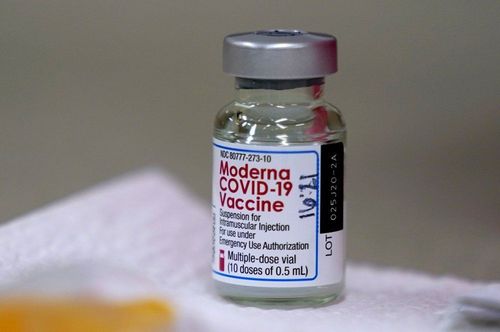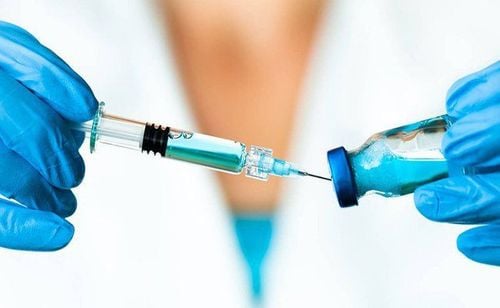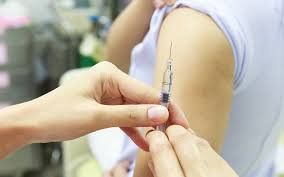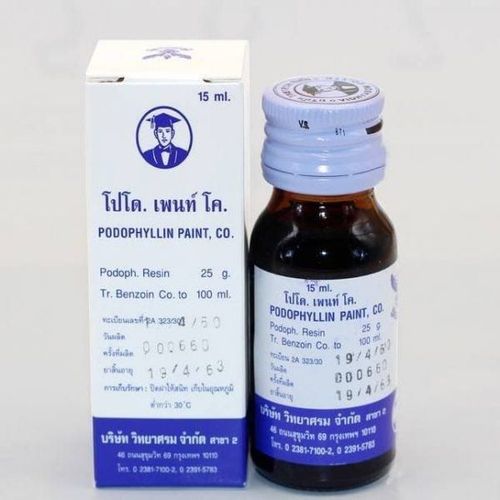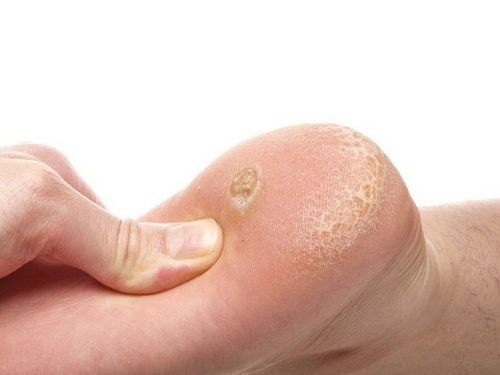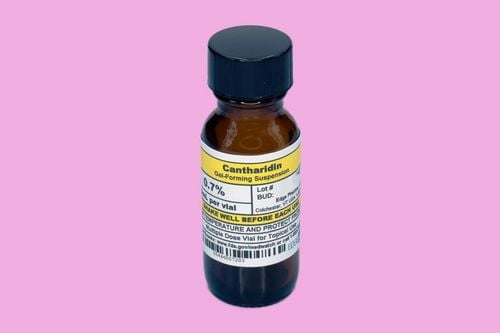This is an automatically translated article.
The article was professionally consulted with Specialist Doctor I Tran Van Sang - Dermatologist - Department of Medical Examination & Internal Medicine - Vinmec Danang International General Hospital.Common warts are raised bumps on the skin caused by the human papillomavirus (HPV) and are transmitted by direct contact. Most common warts are harmless and will go away on their own after a while. But if the wart is annoying or unsightly, what should the person with the wart do?
1. Characteristics of common warts
Common warts appear commonly on fingers or hands with features such as:Small, rough skin; Have skin color, white, pink or brown; Rough to the touch; Sometimes black spots - collections of small blood vessels that have clotted. If you find a common wart with the following signs, you should see a doctor, including:
The pimple is painful or does not stop growing larger, changing color; Have treated warts many times but not cured, even spread or recurred; Warts cause discomfort and interfere with daily activities; Not sure if it's a wart; Many warts begin to appear in adults (indicating a problem with the immune system).
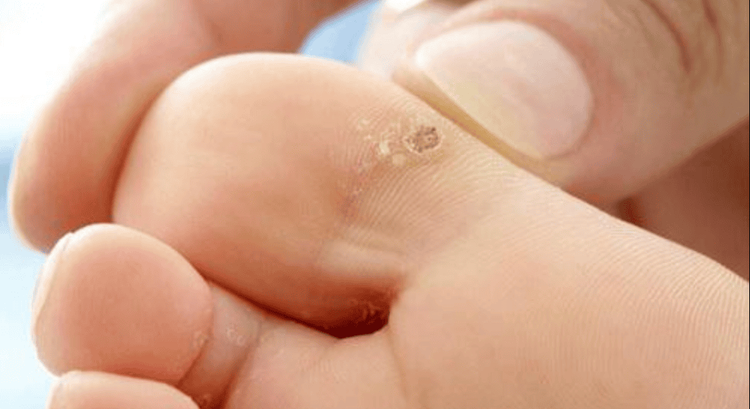
2. Warts: causes and risk factors
Common warts are caused by the human papillomavirus (HPV). This virus is quite common and there are more than 150 different strains, but only a few groups of them are the cause of warts. Some strains of HPV are sexually transmitted, but the main form of transmission is through skin-to-skin contact or through shared objects, such as towels. The virus usually enters the body through an open wound in the skin, including a scratch around a fingernail or a abrasion (abrasion). So the habit of biting nails can also cause warts to spread on the fingertips and around this area.Once your skin has been exposed to the virus, warts will form and grow within 2 - 6 months. Everyone's immune system reacts to the HPV virus differently, so not everyone who comes in contact with them will get warts. People at high risk of developing common warts include:
Children and young adults: Because the body has not yet built up a complete immunity to the virus; People with weakened immune systems, such as: Patients with HIV/AIDS or who have undergone an organ transplant.
3. Wart diagnosis and treatment
3.1. Diagnose
In most cases, a doctor can diagnose common warts using the following techniques:Check for warts; Scrape the top layer of the wart to check for dark spots caused by blood vessel clots; Biopsy a small portion of the wart and sending it to a laboratory for analysis to rule out other skin conditions;
3.2. Warts and how to treat them at the hospital
Answering the question "What to do with warts?", doctors said that most common warts will disappear on their own without treatment after appearing for about 1-2 years (sometimes there will be new acne growing around). Some people decide to see a doctor for warts treatment because home remedies don't work and the warts are uncomfortable, widespread, or unsightly.The goal of treatment is to destroy the wart and stimulate the immune system's response to fight the virus. A course of treatment can last from a few weeks to a few months, but sometimes warts still tend to recur or spread. Doctors usually start with the least painful methods, especially when treating young children.
Based on the location of the wart, the symptoms and the patient's wishes, the doctor will prescribe the wart treatment in the following ways:
Strong peels containing salicylic acid This wart remover works to remove individual warts. wart layer with strong intensity. Studies show that salicylic acid is more effective when combined with cryotherapy.
Freezing (freezing therapy) The doctor will apply liquid nitrogen to the patient's warts to freeze them. The dead tissue will then slough off within at least a week. This method also has the potential to stimulate your immune system to fight the wart virus and needs to be repeated several times. Side effects of cryotherapy are pain, blistering, and skin discoloration in the treated area. Therefore, this technique is not usually used to treat warts in young children.
Other acids Where a wart doesn't respond to salicylic acid or freezing therapy, your doctor may try scraping the surface of the wart and then applying trichloroacetic acid with a wooden stick. This method requires a few repetitions every week or so, with the effect of burning and stinging sensations.
Minor surgery Unpleasant tissues will be removed and may leave scars after treatment.
CO2 laser ablation The laser will burn the wart tissue. However, the effectiveness of this method is not high and can cause pain and scarring.
3.3. Warts and home remedies
Home treatment is usually effective in getting rid of common warts. If your immune system is not weakened or you do not have diabetes, you can try the following:Salicylic acid Over-the-counter wart removal products such as salicylic acid are widely available in drugstores. in the form of patches, ointments and liquid solutions. For common warts, 17% salicylic acid (brands Compound W, Dr. Scholl's Clear Away Wart Remover, ...) should be used daily and continuously for a few weeks. For best results, soak the wart in warm water for a few minutes before applying the medication, combining with a pumice stone every day.
If your skin is irritated then you need to reduce the frequency of wart treatment with this method. Pregnant women should consult their doctor before using acidic solutions.
Freezing Some liquid nitrogen products are available in liquid or over-the-counter spray form. Commonly used brands are Compound W Freeze Off, Dr. Scholl's Freeze Away, ...
Glue the wart with a special tape for about 6 days. Then soak in water and gently remove dead tissue with an emery pumice stone. Leave the wart open for about 12 hours and repeat the process until the wart falls off.
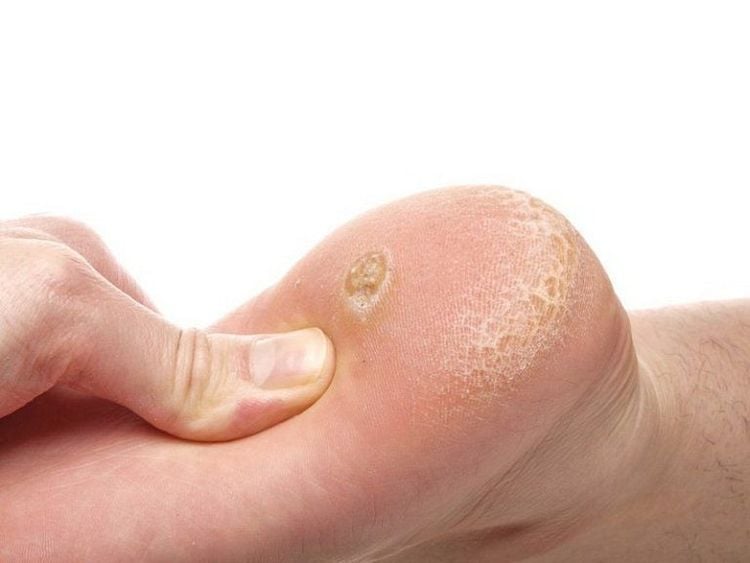
4. Prevent common warts
In addition, health experts also say that the HPV vaccine is a way to help prevent common warts and limit the risk of some other cancers also caused by the HPV virus.Vinmec International General Hospital is currently providing HPV vaccination services with 2 types: Gardasil 0.5ml vaccine manufactured by MSD (USA) and Cervarix vaccine manufactured by GSK - Belgium manufacturing. Vaccination service at Vinmec International General Hospital also gives customers the following benefits:
Customers who come to use the vaccination service will be fully examined and screened by specialist doctors. enough health and condition problems, advice on preventive vaccines and injection regimens, how to monitor and care for customers after vaccination before giving the indication for vaccination according to the latest recommendations of the Ministry of Health. The Ministry of Health & World Health Organization aim to ensure the best effectiveness and safety for people getting vaccinated. The team of doctors is experienced and professional, applying effective pain relief to customers during the vaccination process. 100% of vaccinated customers are monitored 30 minutes after injection and reassessed before leaving. Underwent general supervision before, during and after vaccination at Vinmec Health System and always have an emergency team ready to coordinate with the vaccination department to handle cases of anaphylaxis, respiratory failure - circulatory arrest, ensuring Ensure timely and correct handling when incidents occur. In particular, the vaccination room is airy and has a play area for children, helping children to feel comfortable and good psychologically before and after vaccination. Vaccines are imported and stored in a modern cold storage system, with a cold chain that meets GSP standards, keeping vaccines in the best conditions to ensure quality. In case parents take their child to get vaccinated, they will receive a reminder message before the vaccination date and the child's vaccination information will be synchronized with the national immunization information system.
Please dial HOTLINE for more information or register for an appointment HERE. Download MyVinmec app to make appointments faster and to manage your bookings easily.
Reference source: Mayoclinic.org




